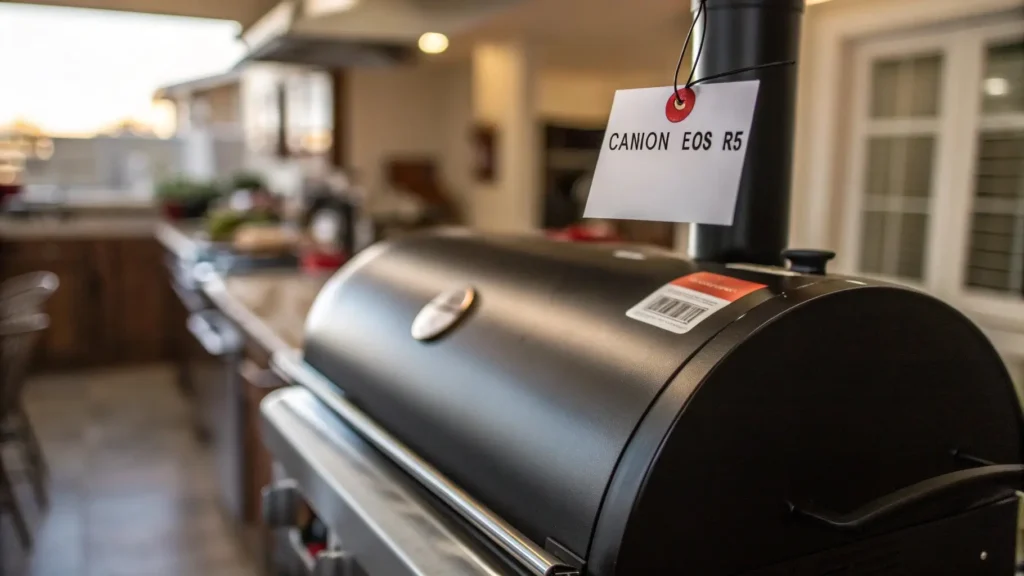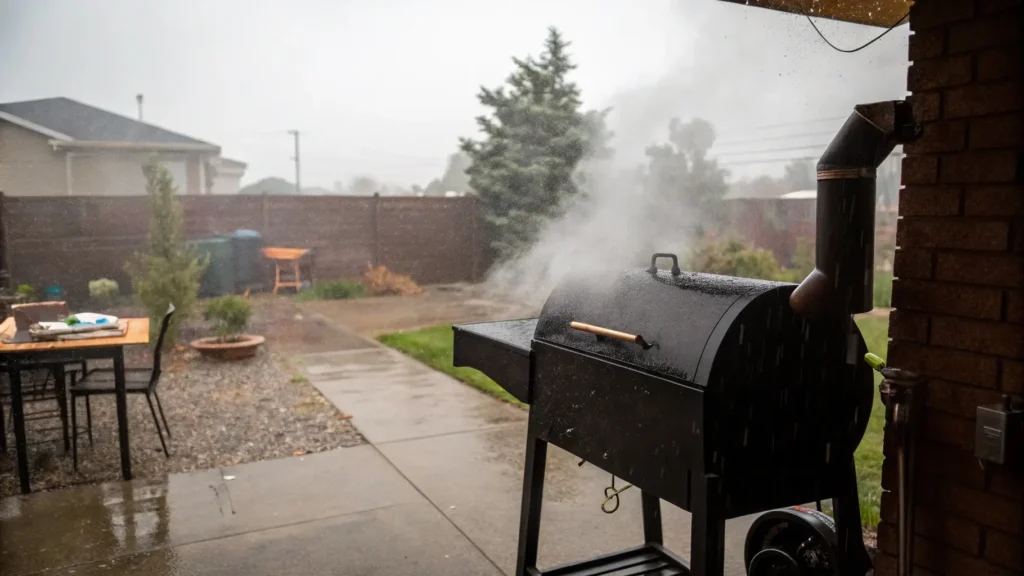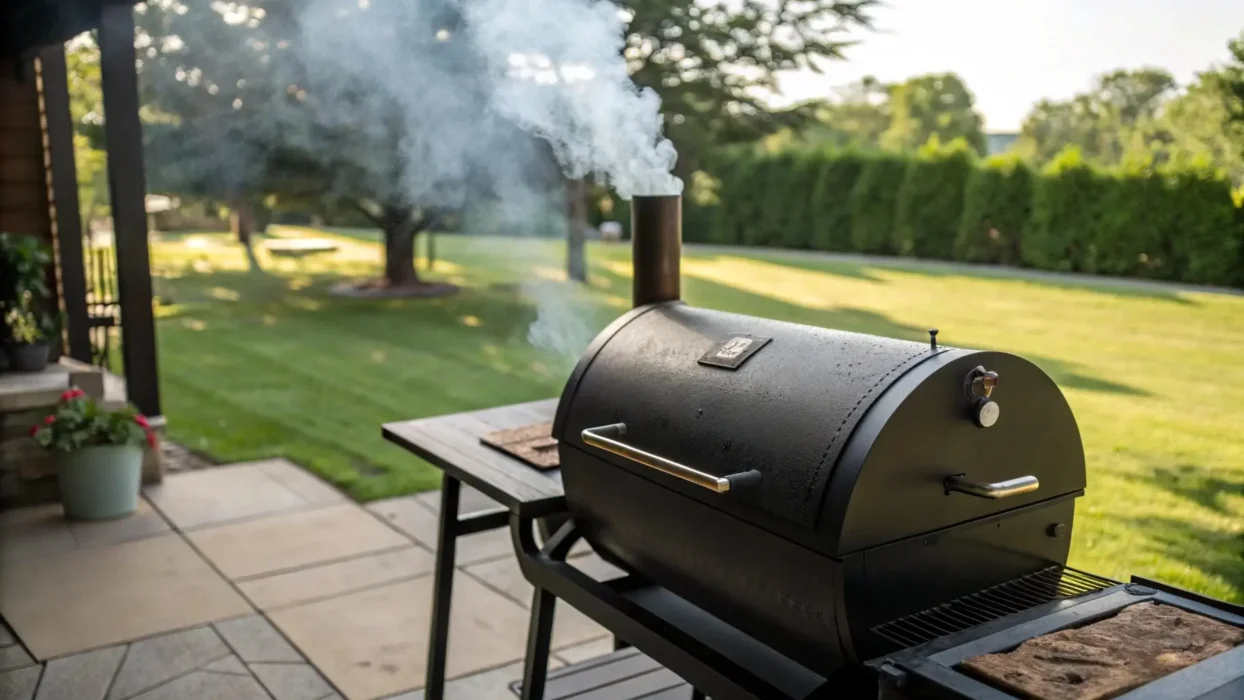If you’re considering a pellet smoker, it’s important to weigh both the pros and the negatives of a pellet smoker. While they offer convenience and great flavor, there are a few downsides you might want to keep in mind. From higher upfront costs to maintenance and temperature control issues, understanding these potential drawbacks can help you decide if a pellet smoker is right for you.
Table of Contents
How Does a Pellet Smoker Work?
At its core, a pellet smoker works by feeding wood pellets into a firepot, where they are ignited by an electric element. Once burning, the smoker uses a fan to circulate heat and smoke around your food. You control the temperature with a digital panel (or app, in some cases), which adjusts the pellet feed rate and fan speed. This gives you a lot of control without constantly watching the fire.
Sounds like a dream come true for busy cooks, right? It definitely streamlines the process while still delivering that rich, smoky flavor we all love.
The Pros of Pellet Smokers
Pellet smokers are all the rage in the BBQ world, and for good reason. There are a ton of perks that make them a top choice for grilling enthusiasts—whether you’re a weekend warrior or a seasoned pitmaster.
Quick Overview of Pellet Smoker Benefits
- Set-it-and-forget-it convenience: Once you set the temperature, you can just walk away. You don’t have to babysit the smoker like you would with charcoal or a gas grill. Just let it do its thing.
- Consistent results: Thanks to precise temperature control, you get even cooking every time, so no more worrying about hot spots or uneven grilling.
- Versatility: Want to grill, smoke, bake, or even roast? Pellet smokers can do it all, making them super versatile for any kind of cookout.
- Flavor: The wood pellets provide a rich, smoky flavor that’s hard to beat. It’s a flavor infusion that’s just as good as the one you’d get from a traditional smoker—maybe even better.
What are the Negatives of a Pellet Smoker?
Sure, pellet smokers have their perks, but they’re not perfect. Before you pull the trigger on a shiny new one, let’s talk about some of the downsides. Because, let’s face it, no product is without its flaws.
Key Drawbacks of Pellet Smokers

- Flavor and Smoke Quality: Some people argue that pellet smokers can’t match the depth of flavor you get from a traditional smoker. Since they burn more efficiently and have less direct heat, the flavor might not be as intense.
- Maintenance: These things need a bit of upkeep to keep running smoothly. You’ll have to clean out the hopper and firepot every now and then to avoid clogs or pellet jams.
High Initial Cost
Comparing Pellet Smoker Costs to Traditional Grills
Now, here’s where things get a little tricky. Pellet smokers can be on the pricey side. You’re looking at a hefty initial investment, especially when you compare it to traditional gas or charcoal grills.
Value vs. Price of Pellet Smokers
But if you’re in it for the long haul, it can be worth it. These smokers offer a lot more convenience, consistent results, and versatility than cheaper alternatives. Still, it’s something to consider if you’re working with a tight budget.
Dependency on Electricity
Impact of Power Outages on Pellet Smokers
Another thing to think about—pellet smokers need electricity to work. So, if you live in an area prone to power outages or if you’re planning on cooking off the grid, this could be a dealbreaker.
Limited Usability Without Electricity
Unlike traditional smokers, which can still work with just a fire and some charcoal, pellet smokers rely on power to run their digital controls and keep the fan going. No juice? No BBQ.
Limited Temperature Control
Difficulty in Achieving Extreme Temperatures
If you’re someone who loves to crank the heat up for a quick sear, a pellet smoker might not be your best bet. These smokers can have a hard time reaching super high temps (like 700°F and above), which means they might not be great for certain styles of cooking like searing steaks or grilling pizza.
Why Some Pitmasters Prefer Traditional Methods
While pellet smokers are great for slow cooking and smoking, they don’t quite hit the mark for high-heat methods, which is why some pitmasters stick with traditional methods.
Pellet Consumption and Fuel Costs
How Much Pellet Smokers Consume
Here’s another point to keep in mind: pellet smokers can burn through pellets faster than you might expect. Depending on the temperature and how long you’re cooking, you might go through a pretty good amount of pellets for a single session.
The High Cost of Wood Pellets
And don’t forget—the pellets themselves aren’t exactly cheap. Depending on the type of wood you’re using, the cost of fuel can add up over time.
Potential for Mechanical Failures
Common Malfunctions in Pellet Smokers
Like any machine, pellet smokers are prone to the occasional malfunction. From auger jams to firepot issues, they can break down from time to time.
The Cost of Repairs and Maintenance
When something goes wrong, repairs can be expensive. It’s a little frustrating, especially if you just want to get your smoke on, but regular maintenance can help avoid most major problems.
Pellet Smokers and Their Environmental Impact
We’re all about enjoying great food, but let’s not forget that even our beloved pellet smokers have a bit of an environmental footprint. From energy consumption to waste production, there are a few things to keep in mind when thinking about the eco-impact of pellet smokers.
Energy Consumption and Sustainability
One of the first things you’ll notice with pellet smokers is their need for electricity. While this gives you control over temperature and cooking time, it also means you’re using power for the whole process. The good news is that pellet smokers tend to use less energy than other electric grills or smokers, but if you’re really trying to go green, consider how often you’re using the smoker and how much electricity it requires.
For those really into sustainability, it’s also worth noting that the pellets themselves are made from compressed wood, often by-products from the timber industry, which is a more eco-friendly option compared to traditional fuels. Still, it’s important to keep energy consumption in check—because every little bit counts!
Waste Produced by Pellet Smokers
Like any grill or smoker, pellet smokers produce some waste. Most of it comes from the wood pellets themselves. After they burn, you’re left with ash. It’s not the worst thing in the world since wood ash can be used in compost or as fertilizer in small amounts. However, it’s still waste, and you’ll need to clean it out regularly to keep your pellet smoker working properly. This is one of the negatives of a pellet smoker that some users overlook.
Pellet Quality Issues
If you’ve ever had a bad experience with pellet smokers, the issue might be with the pellets. Not all pellets are created equal, and using low-quality pellets can seriously affect your cooking. This inconsistency in pellet quality is one of the negatives of a pellet smoker that can really throw off your BBQ game.
Inconsistency in Pellet Quality
Pellet quality can vary a lot, depending on the brand and the type of wood used. Some pellets might burn too fast, while others could produce too much ash or cause your smoker to get clogged. This can throw off your cooking results, making it harder to get that perfect BBQ flavor. As a result, poor pellet quality is one of the negatives of a pellet smoker that can make your grilling experience frustrating.
How Poor Pellets Affect Cooking Performance
Low-quality pellets can mess with your temperature control and cause your pellet smoker to run inconsistently. When that happens, it can be tricky to achieve the flavors and textures you’re going for. Plus, poor pellets can leave behind a bitter aftertaste, which is definitely not something you want for your ribs or brisket. This is another of the negatives of a pellet smoker that can impact the quality of your food.
Size and Portability Limitations
Pellet smokers are definitely more on the bulky side. Sure, they come with all the tech features and benefits, but let’s face it—they’re not the easiest to move around.
Bulky Design and Storage Challenges
One of the negatives of a pellet smoker is the bulky design, which makes it tricky to store. These smokers take up a lot of space, especially with the hopper for pellets and extra accessories. If you’re tight on space, like in a small apartment or a backyard with limited room, you may want to rethink whether a pellet smoker suits your needs. The downsides of a pellet smoker in terms of storage can be a dealbreaker if you’re looking for something compact.
Difficulty in Moving Pellet Smokers for Camping or Tailgating
Another negative of a pellet smoker is its weight and size, which make it difficult to move around, especially for things like tailgating or camping. Unlike portable gas grills, pellet smokers can be heavy, and their reliance on electricity adds an extra challenge when you’re far from a power source. For those who love the convenience of portable grills, the negatives of a pellet smoker in terms of portability may outweigh its other benefits.
Longer Cooking Time Compared to Gas Grills
Pellet smokers are known for their slow-cooked goodness, but that also means they take longer to heat up and cook compared to gas grills.
Slow Heat-Up Times and Their Impact on Cooking Efficiency
Let’s be real—if you’re in a rush, pellet smokers might not be your best friend. They typically take longer to preheat and reach your desired cooking temperature. That’s because the pellets need time to ignite and stabilize before you can start cooking. So, if you’re looking to whip up a quick dinner, a gas grill or a stovetop might save you some time.
Why Pellet Smokers Take Longer to Cook
Pellet smokers work by slowly feeding pellets into the firepot, and that slow burn is what creates that delicious, smoky flavor. But, because the cooking process is more gradual, it takes longer for your food to reach the perfect temperature. If you’re okay with the wait, though, the results are totally worth it.
Risk of Over-Smoking
One of the biggest complaints from pellet smoker newbies (and even some seasoned pros) is the risk of over-smoking your food.
How Pellet Smokers Can Over-Saturate Food with Smoke
If you’re not careful, you could end up with food that’s way too smoky. Pellet smokers are designed to impart a lot of flavor, but some users have found that it can be easy to overshoot and end up with a meal that’s overwhelmed by the smoke. That smoky flavor is amazing in moderation, but too much can ruin the dish.
Tips to Prevent Over-Smoking
To avoid over-smoking, try adjusting the pellet feed rate or temperature for lighter smoking. Another tip is to cook at a lower temperature and gradually increase the heat, which will help keep the flavor balance just right.
Limited Smoking Capacity
While pellet smokers are great for most small-to-medium cooks, they do have their limits when it comes to capacity.
Smaller Cooking Area Compared to Traditional Smokers
Pellet smokers usually have a smaller cooking surface compared to traditional offset smokers or drum smokers. This can be a challenge if you’re feeding a large crowd or planning a big BBQ bash. You’ll likely need to cook in batches or invest in a larger unit if you plan on smoking large cuts of meat.
How to Maximize Cooking Space in Pellet Smokers
To get the most out of your pellet smoker’s space, think about arranging your food in a way that maximizes airflow. Avoid overcrowding the smoker, which can block the heat and smoke from circulating properly. You can also look into adding additional racks or shelves for better space usage.
Understanding the Learning Curve
Pellet smokers are pretty easy to use once you get the hang of it, but don’t expect to master them overnight.
How Easy or Difficult Is It to Master Pellet Smoking?
For beginners, there can be a bit of a learning curve. Temperature control, pellet selection, and smoke levels are all things you’ll need to get right to achieve the perfect cook. But once you figure it out, it’s smooth sailing.
Common Mistakes Beginners Make
Some common rookie mistakes include setting the wrong temperature, overloading the smoker, or using poor-quality pellets. Don’t worry, though—every mistake is just another step toward becoming a pellet smoker pro!
The Effect of Weather Conditions on Pellet Smokers
Weather conditions can have a surprising impact on how well your pellet smoker works.
Performance Issues in Cold, Wet, or Windy Conditions

Pellet smokers can struggle in extreme weather. Cold temps can slow down pellet burning, while strong winds might interfere with temperature stability. So, if you’re cooking in chilly or wet weather, be prepared for the possibility of slower cook times or temperature fluctuations.
How Weather Affects Pellet Smoker Efficiency
For optimal performance, try to keep your smoker sheltered from wind and rain. Cold weather cooking might require you to keep the temperature higher than usual to compensate for the cooler environment. Just keep an eye on things, and you’ll be fine.
That’s a wrap on the environmental impact and some additional considerations when using pellet smokers! Keep these factors in mind to make sure you’re getting the best out of your smoker while keeping everything as efficient and practical as possible. Happy smoking!
Frequently Asked Questions (FAQ)
What are the main drawbacks of using a pellet smoker?
The main drawbacks of pellet smokers include their high initial cost, reliance on electricity, and limited temperature control. They also have issues with pellet consumption, fuel costs, and may experience mechanical failures. Additionally, pellet smokers can be bulky and less portable than other grills.
Are pellet smokers more expensive than traditional grills?
Yes, pellet smokers tend to be more expensive than traditional charcoal or gas grills. The initial investment can be quite high, especially for larger, feature-rich models. However, many users find the convenience and flavor of pellet smokers worth the price.
What is the best thing to smoke on a pellet smoker?
If you’re just getting started, ribs are a great choice. They’re forgiving and pack in that classic smoky flavor. But, honestly, the best thing to smoke depends on your taste. Brisket and pulled pork are also fantastic options, especially if you’re craving a low-and-slow cook. Chicken and turkey also turn out incredibly juicy and flavorful when smoked on a pellet grill. If you’re looking to try something fun, give smoked salmon a shot—it’s surprisingly easy and delicious.
What is the first thing you should cook on a pellet grill?
When you’re new to pellet grilling, start with something simple to get the hang of it. Chicken wings or pork chops are great first choices. They cook fairly quickly and give you an idea of how the temperature and smoke work together. Once you’re comfortable, try something more challenging, like a brisket or baby back ribs. Just be patient, and don’t rush the process—pellet smokers are all about low and slow!
What is the best meat to cook in a pellet smoker?
The best meats to cook on a pellet smoker are those that benefit from the slow, steady heat and rich flavor. Brisket, pulled pork, and ribs are some of the most popular choices. The fat content in these cuts allows them to get tender and juicy as they cook over hours of smoke. If you’re into more tender meats, chicken (especially thighs and legs) and turkey also do well on a pellet smoker. And don’t forget about sausages—they pick up amazing flavor from the smoke!
What not to do on a pellet grill?
Here’s a quick list of things you’ll want to avoid when cooking on a pellet grill:
- Don’t overcrowd the grill: Give each piece of meat some space to allow the heat and smoke to circulate.
- Don’t skip the preheating: Pellet smokers need time to reach the right temperature. Skipping this step can mess with your cook time and results.
- Don’t use low-quality pellets: Cheap pellets can cause issues with temperature control and might not give you the clean, flavorful smoke you want.
- Don’t mess with the temperature constantly: Pellet smokers can take a little while to adjust, so avoid opening the lid too often or changing the temperature too much. Let the smoker do its thing!
Conclusion
Pellet smokers are a fantastic option for anyone who loves slow-cooked, smoky flavors. While they come with some unique challenges—like managing pellet quality, understanding the learning curve, and dealing with weather conditions—they’re incredibly versatile and efficient once you get the hang of it. Whether you’re smoking a juicy brisket, tender ribs, or a whole chicken, pellet smokers make it easy to create delicious meals with that signature smoky flavor.
So, if you’re considering a pellet smoker for your next BBQ, just remember to keep an eye on your pellet quality, be patient with the cooking process, and enjoy the journey. With the right setup and a bit of practice, you’ll be cooking up some mouthwatering meals in no time. Happy smoking, and here’s to many great BBQs ahead!

